Node.js has revolutionized server-side development by leveraging the efficiency and flexibility of JavaScript.
Its asynchronous, non-blocking I/O model, combined with a rich ecosystem of libraries and a vibrant community, makes it a powerful tool for building scalable, high-performance applications.
1) Unified JavaScript Development
- Single Language for Both Front-End and Back-End: Node.js allows developers to use JavaScript for both client-side and server-side programming.
2) Asynchronous and Non-Blocking I/O
- Efficient Handling of Multiple Requests: Node.js uses a non-blocking, event-driven I/O model, which enables it to handle many simultaneous connections efficiently.
3) High Performance and Scalability
- Fast Execution: Built on the V8 JavaScript engine, Node.js executes code quickly by compiling JavaScript to native machine code.
- Access to a Vast Library of Modules: Node.js comes with npm (Node Package Manager), which hosts the largest collection of open-source libraries and modules.
5) Real-Time Capabilities
- Ideal for Real-Time Applications: Node.js is well-suited for applications requiring real-time interactions, such as online games, collaborative tools, and messaging platforms.
Node.js is a versatile and powerful runtime environment that is widely used in various domains of software development.
Its asynchronous, non-blocking I/O model and efficient performance make it well-suited for a range of applications.
Node.js offers a broad range of applications due to its non-blocking, event-driven architecture, high performance, and versatility.
From web servers and APIs to real-time applications and IoT projects, Node.js provides the tools and capabilities needed to build efficient, scalable, and high-performance software solutions.
Its extensive ecosystem and active community further enhance its utility, making it a valuable technology for modern software development.
5 Best Books To Learn Node.JS
Here are 5 best books to learn node.js according to our research mentioned below:
1) Beginning Node.js, Express & MongoDB Development
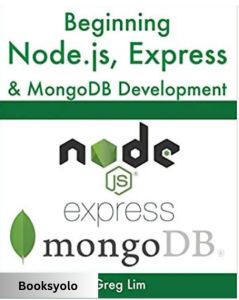
Beginning Node.js, Express & MongoDB Development
Beginning Node.js, Express & MongoDB Development by Greg Lim is an instructional guide designed to introduce developers to building web applications using Node.js, Express, and MongoDB.
This book serves as a practical resource for learning how to create full-stack applications, combining server-side programming, web framework capabilities, and database management.
The book focuses on the integration of three key technologies in modern web development: Node.js, Express.js, and MongoDB.
It is structured to take readers from fundamental concepts to advanced application development, providing hands-on experience with each technology.
2) Node.js Design Patterns
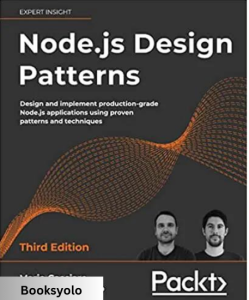
Node.js Design Patterns
Node.js Design Patterns by Mario Casciaro is a comprehensive guide to mastering design patterns and architectural strategies specifically for Node.js applications.
This book is aimed at developers who want to elevate their Node.js programming skills by understanding and applying design patterns to create more robust, scalable, and maintainable applications.
Scope: The book explores a range of design patterns and architectural techniques that are essential for building high-quality Node.js applications.
It covers both fundamental and advanced patterns, offering readers a thorough understanding of how to apply these concepts effectively in their projects.
3) Node.js Design Patterns – Second Edition
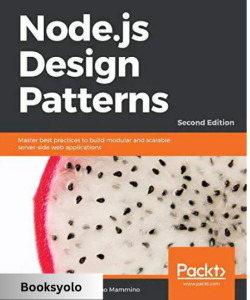
Node.js Design Patterns – Second Edition
Node.js Design Patterns – Second Edition by Mario Casciaro is a refined and updated guide that delves deeper into the application of design patterns within the context of Node.js development.
This second edition builds on the foundations of the original book, incorporating new insights and best practices to reflect the latest advancements in the Node.js ecosystem.
Scope: The second edition of Node.js Design Patterns offers an expanded exploration of design patterns and architectural strategies tailored for Node.js applications.
It includes updated content that addresses recent changes and improvements in the Node.js platform, providing readers with the most current practices and techniques.
4) Node.js Web Development: Server-Side Web Development Made Easy
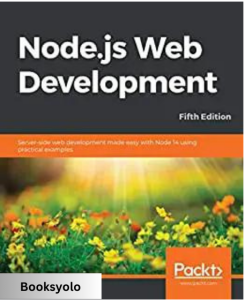
Node.js Web Development: Server-Side Web Development Made Easy
Node.js Web Development: Server-Side Web Development Made Easy by David Herron is a comprehensive guide designed to simplify the process of server-side web development using Node.js.
This book provides a clear and accessible introduction to building web applications with Node.js, focusing on practical techniques and best practices to help developers create efficient and scalable server-side solutions.
Scope: The book covers fundamental and advanced concepts in Node.js web development.
It provides a step-by-step approach to learning Node.js, starting from the basics and advancing to more complex topics such as middleware, routing, and database integration.
Node.js Web Development: Server-Side Web Development Made Easy by David Herron is an excellent resource for developers seeking to learn server-side web development with Node.js.
Its beginner-friendly approach, practical examples, and comprehensive coverage make it a valuable guide for building effective and scalable web applications.
Whether you’re new to Node.js or looking to enhance your server-side development skills, this book provides the knowledge and tools needed to succeed in creating robust web solutions.
5) Node Cookbook
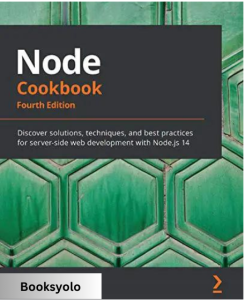
Node Cookbook: Discover solutions, techniques, and best practices
Node Cookbook: Discover Solutions, Techniques, and Best Practices by David Mark Clements is a practical guide designed to help developers master Node.js through a collection of real-world solutions, techniques, and best practices.
This book is ideal for developers who want to deepen their understanding of Node.js by learning through practical, hands-on examples.
The book offers a comprehensive set of recipes—each one a solution to a specific problem or task in Node.js development.
It covers a broad range of topics, from basic to advanced, providing readers with practical techniques and best practices for building efficient and scalable Node.js applications.
Node Cookbook: Discover Solutions, Techniques, and Best Practices by David Mark Clements is a valuable resource for developers looking to enhance their Node.js skills through practical, hands-on examples.
Its collection of recipes offers a wide range of solutions and best practices for common development tasks, making it an essential guide for building efficient, scalable, and high-quality Node.js applications.
Whether you’re a beginner or an experienced developer, this book provides the tools and techniques needed to tackle real-world challenges and improve your Node.js expertise.

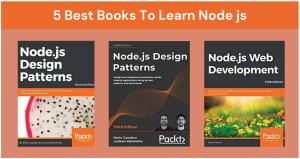






Leave a Comment